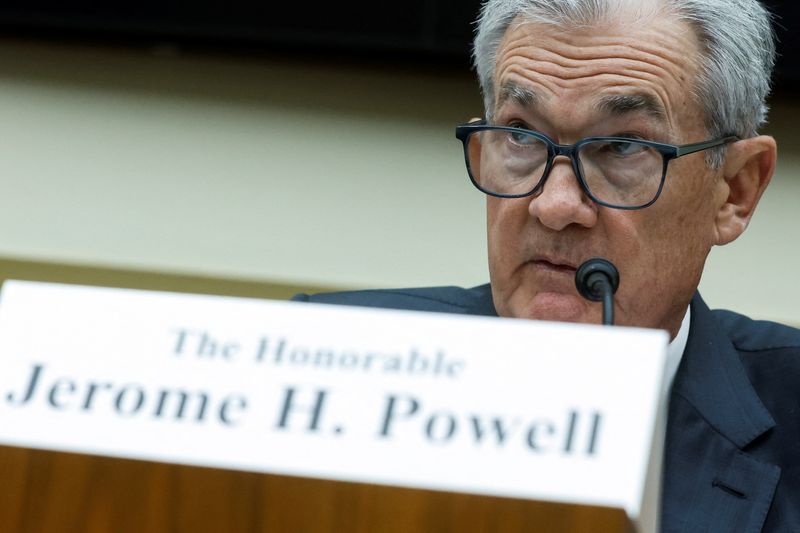By Howard Schneider and Ann Saphir
WASHINGTON (Reuters) - U.S. Federal Reserve Chair Jerome Powell said on Thursday the central bank would move interest rates at a "careful pace" from here as policymakers edge towards a stopping point for their historic round of monetary policy tightening.
"We're at least close to where we think our destination is...and it only makes common sense to move...at a careful pace," Powell said at a hearing before the Senate Banking Committee.
"The point" of holding rates steady at the Fed's meeting last week, Powell said, was precisely to slow the speed with which the Fed was raising borrowing costs.
After having raised rates at 10 straight meetings, sometimes by as much as three quarters of a point at a time, the Fed skipped the June meeting. Investors now expect rate hikes to resume in July, with the Fed perhaps evaluating the need for further increases at every other session - a pace common in prior tightening cycles.
"We don't want to do more than we have to...Overwhelmingly people on the (Federal Open Market) Committee do think that there's more rate hikes coming but we want to make them at a pace that allows us to see incoming information."
Powell did not specify his own view on when and how high rates should move. Most policymakers see at least two more quarter-point rate increases by the end of this year.
But Powell did say he shared the broad economic outlook of his colleagues for modest economic growth, a slight rise in unemployment, and slowly declining inflation over the rest of the year.
It's that outlook, Powell said, which led most policymakers to feel that one or two more rate increases would be adequate to finish the Fed's inflation fight.
"If all those things happen we are within a couple of rate hikes of the level we need to get to,” Powell said.
NO CLEAR CONSENSUS
But the view is not universally shared - either outside the Fed or within it.
Fed Governor Michelle Bowman, while not specifying her estimate of how high the Fed may need to move rates, said on Thursday further "rate increases" were needed - indicating she feels at least two more hikes are warranted. Three Fed officials feel more than that will be required.
Atlanta Fed President Raphael Bostic on Wednesday, by contrast, said he feels rates don't need to rise at all from the current range of between 5% and 5.25%, a view shared by only one other of the Fed's 18 policymakers, according to the most recent Summary of Economic Projections.
At the Senate hearing, Democratic lawmakers also questioned Powell about why rates needed to move higher, given the possible risks to the economy.
Opening a second day of hearings before the U.S. Congress, Powell faced questioning from Ohio Democratic Senator Sherrod Brown, the chair of the Senate Banking Committee, about the likelihood the Fed's efforts to control inflation will lead to a disproportionate loss of jobs for members of racial and ethnic minority groups.
“What Fed governors call 'cooling down' regular people where I live call layoffs,” Ohio Democrat Sherrod Brown, chair of the Senate Banking Committee, said as he opened a hearing that was dominated by Republican lawmakers questions about Fed plans to stiffen bank regulations.
"It is working families who suffer most directly and quickly from inflation," Powell responded.

Asked about rate cuts, Powell said "we don't see that happening any time soon...It is going to have to wait a time when we're confident that inflation is moving down to 2%," the Fed's inflation target.
Prices are currently rising by more than twice that on an annual basis.